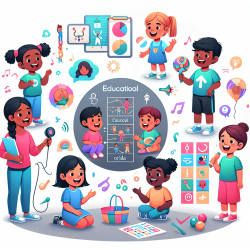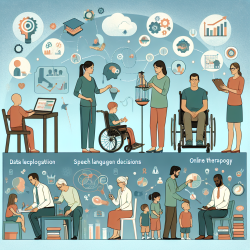As speech-language pathologists (SLPs), our primary goal is to facilitate the best possible outcomes for the children we serve. To achieve this, it's crucial to integrate evidence-based practices into our clinical decision-making. Recent research sheds light on the various intervention approaches used by SLPs to treat speech sound disorders (SSD) in children and evaluates their effectiveness based on scientific evidence.
Understanding Speech Sound Disorders
Speech sound disorders encompass a range of difficulties in the development of phonetic and phonological skills, which can significantly impact a child's intelligibility. The prevalence of SSDs is notable, affecting up to 15.6% of preschool-aged children. These disorders not only pose challenges in communication but also increase the risk of literacy difficulties and socio-emotional issues as children progress through school.
Evidence-Based Intervention Approaches
Various intervention approaches have been developed to address SSDs, each supported by different levels of scientific evidence. The Oxford Centre for Evidence-Based Medicine Levels of Evidence is a widely recognized model for categorizing the quality of evidence, ranging from Level 1 (highest) to Level 5 (lowest).
Level 1: Highest Evidence
- Traditional Articulation Approach: Focuses on acquiring one problematic phoneme at a time. Supported by multiple studies, including randomized controlled trials.
- Minimal Pairs Therapy: Contrasts words differing by one phoneme to highlight differences. Widely researched and proven effective.
- Maximal Oppositions Therapy: Uses pairs of words with phonemes that are maximally different to enhance phonological contrast.
- Multiple Oppositions Therapy: Targets multiple phonemes simultaneously to address extensive phonological errors.
- Core Vocabulary Approach: Focuses on consistent production of a set of high-frequency words.
- Cycles Approach: Targets multiple phonological patterns in cycles to promote generalization.
- Nuffield Centre Dyspraxia Programme: A structured program for treating childhood apraxia of speech.
- Speech Assessment and Interactive Learning System (SAILS): Enhances speech perception through auditory input.
Level 2: Moderate Evidence
- Metaphon Therapy: Improves phonological awareness and self-correction through contrastive phoneme training.
- PROMPT Therapy: Uses tactile cues to guide articulation.
- Nonlinear Phonology Approach: Focuses on hierarchical phonological structures rather than individual sounds.
- Integral Stimulation: Emphasizes imitation of visual and auditory cues provided by the clinician.
Levels 3-5: Lower Evidence
- Stimulability Approach: Uses characters and gestures to enhance phoneme production.
- Motor Learning Principles: Applies motor learning principles to speech therapy, focusing on movement patterns and feedback.
- Natural Speech Dynamics: Utilizes auditory, visual, and kinesthetic inputs, though lacking scientific validation.
- Auditory Bombardment: Involves repetitive auditory exposure to target phonemes, but its effectiveness is questionable.
- Nonspeech Oral Motor Exercises: Includes non-speech activities like blowing, which have been proven ineffective for SSD treatment.
Current Practices Among SLPs
A survey conducted among 106 SLPs in Quebec revealed the most familiar and frequently used intervention approaches. The top four most known approaches were:
- Traditional Articulation Approach (98%)
- Natural Speech Dynamics (98%)
- Minimal Pairs Therapy (95%)
- Nonspeech Oral Motor Exercises (95%)
However, the most commonly used approaches were:
- Traditional Articulation Approach (91%)
- Integral Stimulation (66%)
- Natural Speech Dynamics (55%)
Comparative Analysis with Other Countries
Comparing these findings with surveys from English-speaking countries like the UK, USA, and Australia reveals some interesting differences. For instance, while the Traditional Articulation Approach is popular in both Quebec and the USA, approaches like Auditory Discrimination and Phonological Awareness are more frequently used in English-speaking countries. This discrepancy may be attributed to language structure differences and the availability of intervention materials tailored to each language.
Implications for Practice
The findings highlight the need for SLPs to critically evaluate and integrate evidence-based practices into their clinical work. While personal experience and peer recommendations play a significant role in approach selection, it's crucial to prioritize interventions with robust scientific backing. Continuous professional development and access to current research can bridge the gap between evidence and practice, ultimately enhancing treatment outcomes for children with SSDs.
To further explore the original research and its implications, you can access the full study in the Canadian Journal of Speech-Language Pathology and Audiology.










